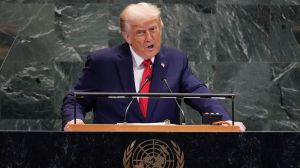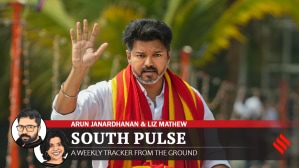In the shadow of Advani
With its emphasis on good organisation, well-defined duties and targets, the BJP has functioned like a well-oiled corporate entity. So wh...

With its emphasis on good organisation, well-defined duties and targets, the BJP has functioned like a well-oiled corporate entity. So when Kushabhau Thakre took over from L.K. Advani as the president of the party in May this year, he had a tough act to follow. And five months on, BJP Inc is still waiting for its new CEO to put his stamp on the organisation.
After the flamboyance and ideological push that the politically acute Advani imparted to the BJP, the low-profile and conservative Thakre is another kettle of fish. Accustomed to Advani’s powerhouse style of functioning, the BJP is now adjusting itself to Thakre’s laidback approach.
Admittedly, Thakre’s mission is not easy. He is expected to expand and consolidate the party’s nationwide growth, lead the party into elections (as early as November) and contend with the heightened expectations of partymen since the BJP is now in power not only at the Centre but in several states.Most important, the BJP has to break new ground if it wants to achieve itsambition to win a majority in the next Lok Sabha. For that, dynamic leadership is a must, though in the tradition of the Sangh Parivar, most important decisions are taken in consultation with Advani, Atal Behari Vajpayee and the RSS.
The BJP has been almost completely identified with Advani, who had been leading the party from 1985 till Thakre took over (except for a two-year break) and is seen as the architect of its phenomenal rise from two MPs to the largest single party in the Lok Sabha.
Thakre’s first task, therefore, is to make himself known to party cadres throughout the country and establish his own image on the national political scene. At present, when his name is mentioned, people often ask uncertainly, “The Shiv Sena chief…?”, confusing him with Bal Thackeray.
Moreover, as those who have worked closely with both Advani and Thakre say, the former was as much a shrewd politician as an organisational leader. He was also a public figure, whereas Thakre is and has been a low-profileorganisation man all his life.
“Advani has the political touch and his responses to political events are sharp and quick. He used to delegate work while keeping a watching brief. He was flexible and receptive to ideas whereas Thakre, because of his background, is more rigid and is fully immersed in organisational matters. Advani was good at media-management; Thakre’s instinct is to avoid publicity,” says a BJP leader.
The difference was obvious during the recent calamities in Gujarat, Uttar Pradesh and Assam. An insider who says Thakre’s priority are organisation, not political gain points out that the BJP chief did not visit either of the states. Something that Advani would have done. On the other hand, if there is an organisational function, Thakre makes it a point to attend.There are others who say he prefers to err on the side of caution. Though the party’s office-bearers were appointed in June, Thakre has still not allocated work. Nor has a spokesperson been appointed. The result is severalvice-presidents and general secretaries are waiting for their duties to be defined.
“It would not have been so if Advani had been president,” admits a BJP leader. “At the moment, the party is just ticking along on its own momentum.”
Thakre’s explanation is that he is waiting for the expected Cabinet expansion so that he knows which of his office-bearers will be free for party work. Cabinet expansion was first expected before the Budget session, then after and is now rumoured to take place next month. In any case, Thakre has now decided to do work distribution after the November elections in four states.
Meanwhile, the old arrangement continues, even though some of the office-bearers have become ministers. Only in the four poll states (Delhi, Rajasthan, Madhya Pradesh and Mizoram) have general secretaries been made election in-charges.
The BJP president, in fact, is concentrating all his energies on the November elections. They are the first polls to be fought under his baton and Thakre is awarethat his leadership is on test. The elections are crucial in more ways than one: if the Congress fares well, it could make a push to form a government.
Thakre has even shed his shyness for the camera in the battle. Though senior than Advani and Vajpayee in both the RSS and the BJP the two have worked under him Thakre has all along deliberately shunned the limelight. But since he has taken over, the 77-year-old leader has set himself a tough schedule, travelling all over the country to meet cadres, with a focus on the polls. Since May, he has hardly been at the Delhi headquarters.
One of Advani’s other major achievements was identifying and grooming promising younger BJP members, who have now gone on to become the party’s second-rung leaders. The list includes K.N. Govindacharya, Pramod Mahajan, Sushma Swaraj, Venkaiah Naidu, Narendra Modi, Uma Bharti, Ananth Kumar, Sushil Modi and Vikram Verma. Thakre is known to be close to Advani and is not expected to rock the boat.
BJP leaders also back him,insisting it is too soon to pass judgement on Thakre. Unlike Advani who was leading an Opposition party, Thakre is the president of a ruling party and all his actions come under the media’s microscope.
“Let him settle down. The past five months have been quite tumultuous — government formation, Cabinet formation, troubles with allies, the Budget session…Now the situation is stabilising,” says a BJP leader. The party hopes that after the November Assembly elections, Thakre will come into his own.
Photos



- 01
- 02
- 03
- 04
- 05




























